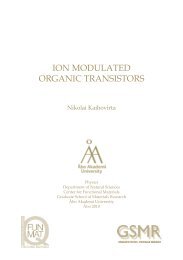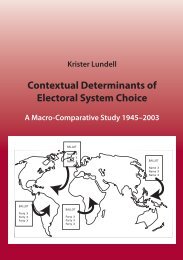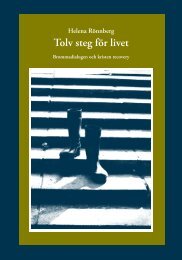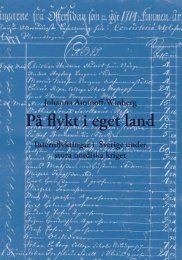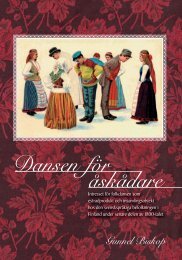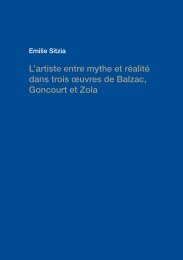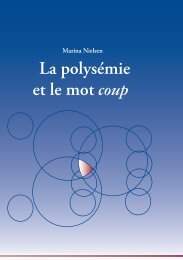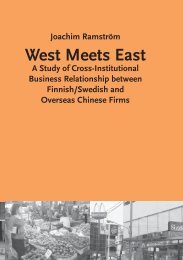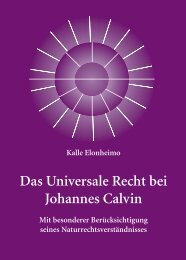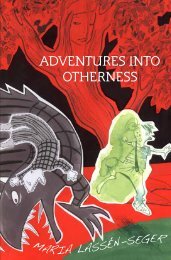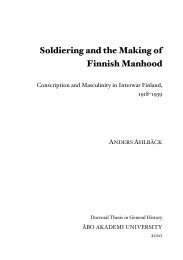- Page 3 and 4:
JAG SER KLART?
- Page 5 and 6:
JAG SER KLART? Synen på den heliga
- Page 7 and 8:
III. BIRGITTA: LIV, OMVÄRLD OCH VE
- Page 9 and 10:
V. ANALYTISK-IDÉHISTORISK KONKLUSI
- Page 11 and 12:
FM Isabella Frantz, FM Malin Hollm
- Page 13 and 14:
I. INLEDNING 1 ”Subtile ingenium
- Page 15 and 16:
inverka lika hämmande (eller ikonk
- Page 17 and 18:
eligiösa referensramar. Hon hade i
- Page 19 and 20:
av ett sökande efter metaforer, do
- Page 21 and 22:
efterföljelse av samtliga metodreg
- Page 23 and 24:
ar har därför i stället fått ge
- Page 25 and 26:
de biografiteoretiska och metodiska
- Page 27 and 28:
I Jensens komparativa mikroanalys a
- Page 29 and 30:
stil. Men både Birger Bergh och Bi
- Page 31 and 32:
Hans Aili utgavs 1992. Bok III, edi
- Page 33 and 34:
4 Bland legender och primärkällor
- Page 35 and 36:
Knut B. Westman: Knut Bernhard West
- Page 37 and 38:
Svenska folkets litteraturhistoria
- Page 39 and 40:
Georg Stiernhielms latinska dikter,
- Page 41 and 42:
II. TID OCH TEORI, METODER OCH MÖN
- Page 43 and 44:
under attack. Historians have plead
- Page 45 and 46:
överhuvuden och betydande ledare v
- Page 47 and 48:
Inte nog med att man tenderar att
- Page 49 and 50:
Stephens, Spencer om Dean Church, M
- Page 51 and 52:
People. Harold Nicolson och Virgini
- Page 53 and 54:
det slutligen språkliga konvention
- Page 55 and 56:
metonymin, synekdoken och ironin. D
- Page 57 and 58:
sak gäller i än högre grad de ps
- Page 59 and 60:
Något av dessa tre skrivsätt domi
- Page 61 and 62:
Min läsning av den teoretiska biog
- Page 63 and 64:
färgade av sig på inställningen
- Page 65 and 66:
2.4 Fångad och fri? Individerna ä
- Page 67 and 68:
Kunskapen om andras upplevelser och
- Page 69 and 70:
Inger Larsson, en faktabaserad genr
- Page 71 and 72:
estetiskt utförda människoskildri
- Page 73 and 74:
och människokunskapens förvetensk
- Page 75 and 76:
a) monumentet b) psykobiografin c)
- Page 77 and 78:
ehöver försvaras eller rationalis
- Page 79 and 80:
Vad beror renässansen på? Kan vi
- Page 81 and 82:
tisk opposition eller samhällsvete
- Page 83 and 84:
Biographien beharrten und ausserdem
- Page 85 and 86:
kan kritiken på sikt få en kvalit
- Page 87 and 88:
men det finns även andra förklari
- Page 89 and 90:
uteslutas som seriös biografitekni
- Page 91 and 92:
Handlingarna och rollerna (och att
- Page 93 and 94:
det livs- och personhistoriska proj
- Page 95 and 96:
Enligt Kristian Hvidt skulle biogra
- Page 97 and 98:
Avgörande för biografins del är
- Page 99 and 100:
andedräkt, trots alla bristfällig
- Page 101 and 102:
mänsklig och gudomlig natur. Smån
- Page 103 and 104:
Den franske filosofen Paul Ricoeur
- Page 105 and 106:
artikulerade tankefigurationer. På
- Page 107 and 108:
Efter att ha läst åtskilliga biog
- Page 109 and 110:
och leder, som Inger Larsson påpek
- Page 111 and 112:
Lurking behind such a criticism is
- Page 113 and 114:
III. BIRGITTA: LIV, OMVÄRLD OCH VE
- Page 115 and 116:
103 modern, hade en nyckelroll som
- Page 117 and 118:
105 Cisterciensermunken Svennung s
- Page 119 and 120:
107 fart på allvar när Birgittas
- Page 121 and 122:
109 clarissorna, fick ett kloster (
- Page 123 and 124:
111 århundradena framöver, tillsk
- Page 125 and 126:
113 yrken. Katarerna var ändå ing
- Page 127 and 128:
115 Bakgrunden är följande. I slu
- Page 129 and 130:
117 påverkade prästerskapet i sin
- Page 131 and 132:
119 förmedlare av Gud hemligheter
- Page 133 and 134:
121 ångest och mirakelbevis till s
- Page 135 and 136:
123 Ovanstående Birgittacitat är
- Page 137 and 138:
125 vulgärgroteska ordalag om det
- Page 139 and 140:
127 Rom eller skänka dem någon bl
- Page 141 and 142:
129 … Sedan skall du bege dig til
- Page 143 and 144:
131 Lars Andersson, som har unders
- Page 145 and 146:
133 skadliga lärdomar”. Lagerbri
- Page 147 and 148:
135 Ur individforskningens historie
- Page 149 and 150:
137 ha bidragit till att skärpa ha
- Page 151 and 152:
139 Upp ur den nationalromantiska h
- Page 153 and 154:
141 populär Birgittabiografi. Vikt
- Page 155 and 156:
143
- Page 157 and 158:
IV. BIRGITTABILDEN I BIOGRAFIERNA 1
- Page 159 and 160:
147
- Page 161 and 162:
I. Populärhistoriska biografier 14
- Page 163 and 164:
151 konventionen inom det klassiska
- Page 165 and 166:
153 helgonlegender och äreminnen.
- Page 167 and 168:
155 vattentäta skott ännu inte ex
- Page 169 and 170:
157 som anakronistiska ju närmare
- Page 171 and 172:
159 av Birgitta som reformationens
- Page 173 and 174:
161 Äfven protestantismens svenska
- Page 175 and 176:
163 Hon ursäktar sig inför risken
- Page 177 and 178:
1.3 Tiden och dess idéer 165 Den s
- Page 179 and 180:
167 historiska romaner, avtar så s
- Page 181 and 182:
169 av C. de Flavigny och Johannes
- Page 183 and 184:
171 Vi vilja ej önska oss medeltid
- Page 185 and 186:
173 Bandet som enar det förflutna
- Page 187 and 188:
175 pietism och katolicismen. Han b
- Page 189 and 190:
177 köns- eller klasstillhörighet
- Page 191 and 192:
179 Inlevelsen i medeltidens miljö
- Page 193 and 194:
181 Historien visar, att den katols
- Page 195 and 196:
183 gestalt gör att vi hör ett mo
- Page 197 and 198:
185 ningar samt Ellen Fries biograf
- Page 199 and 200:
187 ning under den dramatisk-expres
- Page 201 and 202:
189 art för biografin i närheten
- Page 203 and 204:
191 går att utläsa Birgittas pers
- Page 205 and 206:
193 hermeneutiskt djuptolkande meto
- Page 207 and 208:
195 Alla hennes egna nobla och sund
- Page 209 and 210:
197 Stolpes betoning av Birgitta so
- Page 211 and 212:
199 tolkningskontext blir Birgitta
- Page 213 and 214:
201 individuella liv. 284 Med tanke
- Page 215 and 216:
203 Med professor Carlssons metod h
- Page 217 and 218:
205 Vilken denna yttersta makt är
- Page 219 and 220:
207 och aktiva ingripandet som kara
- Page 221 and 222:
209 debattrum av Stolpe. Den bruksf
- Page 223 and 224:
211 Tidigare har man då det gällt
- Page 225 and 226:
213 nämligen en skicklig debattör
- Page 227 and 228:
215 (som så ofta i biografin) mots
- Page 229 and 230:
217 omedvetna motiv för sina handl
- Page 231 and 232:
219 Det objektivt akademiska greppe
- Page 233 and 234:
221 metodmässigt dels genom mental
- Page 235 and 236:
223 analysen söker frilägga den h
- Page 237 and 238:
225 inte var nödvändiga förutsä
- Page 239 and 240:
227 även i hennes förhållande ti
- Page 241 and 242:
3.3 Tiden och dess idéer 229 Med H
- Page 243 and 244:
231 språk och kommunikation i sig
- Page 245 and 246:
233 Förutom Birgit Klockars är Bi
- Page 247 and 248:
235 marginaler befolkade av andra u
- Page 249 and 250:
237 det eklektiska, men modifierand
- Page 251 and 252:
II. Religionspsykologiska biografie
- Page 253 and 254:
1 Knut B. Westman: Uppenbarelse- oc
- Page 255 and 256:
243 psykologisk, sociologisk, genea
- Page 257 and 258:
245 teori i sin djupdykning ner mot
- Page 259 and 260:
247 livshistoria är att skriva rev
- Page 261 and 262:
249 Westmans tolkning är kallelsev
- Page 263 and 264:
251 de konventionella uttrycken kon
- Page 265 and 266:
253 Som vi märker i citatet ovan l
- Page 267 and 268:
255 ingår, enligt Westman, nyplato
- Page 269 and 270:
257 med karaktären av vetenskaplig
- Page 271 and 272:
259 Tidens tankeavtryck i Birgitta-
- Page 273 and 274:
261 nationell övertygelse eller po
- Page 275 and 276:
263 ka och kulturella kapital som k
- Page 277 and 278:
265 och centrum och 4. uppenbarelse
- Page 279 and 280:
267 skrifter och några översättn
- Page 281 and 282:
269 medeltida religiositeten mer ä
- Page 283 and 284:
271 Westmans Birgittatolkning diffu
- Page 285 and 286:
273 ”äganderätt” till Birgitt
- Page 287 and 288:
275 het i samhället. Birgitta uppf
- Page 289 and 290:
277 när utomvetenskapliga värderi
- Page 291 and 292:
279 Vår förste författare. En sj
- Page 293 and 294:
281 Som biograf är Fogelklou på e
- Page 295 and 296:
283 tolkningen, 232 common sense-ps
- Page 297 and 298:
285 Trots denna anmärkning lyfter
- Page 299 and 300:
287 dras in som närvarande i texte
- Page 301 and 302:
2.2 Birgittabild I förordet till B
- Page 303 and 304:
291 Med distans till ”gudomsgulle
- Page 305 and 306:
293 Om kraften inte hade transforme
- Page 307 and 308:
295 Det typiska i medeltidens helgo
- Page 309 and 310:
297 kvinnliga logiken som livets eg
- Page 311 and 312:
299 rösträttsmyndiga. 318 År fö
- Page 313 and 314:
301 kvinnodominans. En internatione
- Page 315 and 316:
303 samlade sina reflektioner i skr
- Page 317 and 318:
305 negligerades av 1800-talets Bir
- Page 319 and 320:
307 personliga friheten och farlig
- Page 321 and 322:
309 År 1920 utkom även en annan,
- Page 323 and 324:
311 delvis ur en äldre romantisk-f
- Page 325 and 326:
313 Jag menar att utgången ur konv
- Page 327 and 328:
315 en tidlös fråga. Fogelklou fr
- Page 329 and 330:
317 till ödesdigra följder, mot v
- Page 331 and 332:
319 den protestantiska tomheten dä
- Page 333 and 334:
321 konklusionen. 430 Här plädera
- Page 335 and 336:
323 en delaktighet i de kristna mä
- Page 337 and 338:
325 eller ”manifest myth” och
- Page 339 and 340:
327 Sundén sig på C.G. Jung och S
- Page 341 and 342:
329 viktigt moment i de apokalyptis
- Page 343 and 344:
331 och ett begripligt psykoanalyti
- Page 345 and 346:
333 skildrar Birgitta som en kvinna
- Page 347 and 348:
335 … kan hon med detta uppbrott
- Page 349 and 350:
337 hur en människa utvecklas till
- Page 351 and 352:
339 blev tydligt i och med 1960-tal
- Page 353 and 354:
341 Jag nämnde tidigare att Sundé
- Page 355 and 356:
343 Birgitta. I den mån detta för
- Page 357 and 358:
345 omedvetna krafterna inom männi
- Page 359 and 360:
347 de ekon hans biografi ljuder av
- Page 361 and 362:
349 smärtsam på grund av den narc
- Page 363 and 364:
III. Fackhistoriska delbiografier 3
- Page 365 and 366:
1 Toni Schmid: Den dramatiska refor
- Page 367 and 368:
355 mönster som biografiskt tolkni
- Page 369 and 370:
357 Men oscillationen mellan omvär
- Page 371 and 372:
359 Två epitet är totaldominerand
- Page 373 and 374:
361 Sierskan längtar icke efter d
- Page 375 and 376:
363 Schmid placerar Birgittas i par
- Page 377 and 378:
365 I historiografiskt perspektiv s
- Page 379 and 380:
367 källkritiska stråna till stac
- Page 381 and 382:
369 notera hur Toni Schmid förbig
- Page 383 and 384:
371 reflexion som bygger på naturv
- Page 385 and 386:
373 Eventuellt uttunnar detta någr
- Page 387 and 388:
375 fungerade principiellt som dubb
- Page 389 and 390:
377 med av ateistiska vetenskapsmä
- Page 391 and 392:
379 Bevisningsaspekten, kombinerad
- Page 393 and 394:
381 biografijaget flyttar till Rom.
- Page 395 and 396:
383 värderingar samt ekonomiska oc
- Page 397 and 398:
385 fåordiga eller rentav tiger. G
- Page 399 and 400:
387 Denna realistiska kvinnoförst
- Page 401 and 402:
389 Stolpes skandinavisk-medeltida
- Page 403 and 404:
391 understryker hur befäst Birgit
- Page 405 and 406:
393 Här kan påpekas att även om
- Page 407 and 408:
395 biografin av en förförståels
- Page 409 and 410:
397 som Klockars gör, är försök
- Page 411 and 412:
399 sig. 239 När biografen söker
- Page 413 and 414:
401 trodde på existerar inte”. I
- Page 415 and 416:
403 I Furuhagens metod finner vi et
- Page 417 and 418:
405 vädjanden från Sverige. Att B
- Page 419 and 420:
407 Det säger sig självt att den
- Page 421 and 422:
409 outraderbara och oomkullrunkeli
- Page 423 and 424:
411 arbetas fram genom analysen av
- Page 425 and 426:
413 förfäktades av Sverker Sörli
- Page 427 and 428:
415 av patetik. Vi ser visserligen
- Page 429 and 430:
417 konceptet. 333 I fenomenologisk
- Page 431 and 432:
419 Om vi följer Aant Elzingas vet
- Page 433 and 434:
421
- Page 435 and 436:
IV. Övriga biografiska bilder 423
- Page 437 and 438:
425 samhällssocialt anpassade mode
- Page 439 and 440:
427 Birgitta knappast mött något
- Page 441 and 442:
429 Birgittabok blev aktuell. Hans
- Page 443 and 444:
431 Allt har ju sin tid; ändå fö
- Page 445 and 446:
433 hagiografierna i fråga är fö
- Page 447 and 448:
435 världen, var Gustav II Adolf o
- Page 449 and 450:
437 Bergom Larssons text om Birgitt
- Page 451 and 452:
439 Birgitta politiseras inte i den
- Page 453 and 454:
441 eller det sociala könet. Ebba
- Page 455 and 456:
3 Feministteologiska och mariologis
- Page 457 and 458:
445 Losman noterar att Birgitta int
- Page 459 and 460:
447 Steffen läser Birgittas relati
- Page 461 and 462:
449 påflugenheten, hänsynslöshet
- Page 463 and 464:
451 genom Birgitta. Piltz ser Birgi
- Page 465 and 466:
453 framhåller Bergquist. Hela tex
- Page 467 and 468:
455 Birgitta. Däremot verkar det v
- Page 469 and 470:
V. ANALYTISK-IDÉHISTORISK KONKLUSI
- Page 471 and 472:
459 antikapitalistisk och antidemok
- Page 473 and 474:
461 Nationalromantiken färgade den
- Page 475 and 476:
463 neurofysiologiskt grundade för
- Page 477 and 478:
465 sina vänner i nyare tid har Bi
- Page 479 and 480:
467 Göran B. Nilssons teoretiska p
- Page 481 and 482:
469 Birgittabilden med självklar i
- Page 483 and 484:
471 överhettat from som hos hagiog
- Page 485 and 486:
473 Jarricks mönster stämmer gans
- Page 487 and 488:
475 redan i studentsammanhang hade
- Page 489 and 490: 477 predikament eller om hon skall
- Page 491 and 492: 479 Som konklusion kan konstateras
- Page 493 and 494: 481 viktigt att separera tron från
- Page 495 and 496: 483 Gustaf Bergström, Anders Piltz
- Page 497 and 498: 485 Birgittabiografierna reflektera
- Page 499 and 500: 487
- Page 501 and 502: VI. FRÅN STORA TILL LILLA HISTORIE
- Page 503 and 504: 491 upp ögonen för olika aspekter
- Page 505 and 506: 493 biografier som delvis varnande
- Page 507 and 508: 495 problemen inställer sig först
- Page 509 and 510: 497 metamännisko- och historiesyn,
- Page 511 and 512: 499 Under arbetet med min biografik
- Page 513 and 514: 501 avstannar narrationen ideligen.
- Page 515 and 516: 503 den till och med nästan för h
- Page 517 and 518: 505 nell legitimitetslicens hos bio
- Page 519 and 520: 507 med hjälp av de konventioner s
- Page 521 and 522: 509 Birgittabiografierna hittade i
- Page 523 and 524: 511 fornsvenska och birgittinnorska
- Page 525 and 526: 513 självbiografiska redovisning h
- Page 527 and 528: 515 perspektivet tycker jag att den
- Page 529 and 530: 517 Om rytmen av det liv som pulser
- Page 531 and 532: 519 Daniel Madelénat räknade in p
- Page 533 and 534: 521
- Page 535 and 536: 523 VII. AVSLUTANDE OVETENSKAPLIG E
- Page 537 and 538: 525 över allas vår relativitet. F
- Page 539: 527 The modern paradigm emerged fro
- Page 543 and 544: 531 model in the suffragist struggl
- Page 545 and 546: 533 Eva Österberg, Ingemar Nilsson
- Page 547 and 548: 535 Lurking behind such a criticism
- Page 549 and 550: Reuelaciones celestes: Book I, with
- Page 551 and 552: 539 Andræ, Daniel, ”Nationalroma
- Page 553 and 554: 541 Bremer, Fredrika, Lifvet i gaml
- Page 555 and 556: 543 Dinzelbacher, Peter, ”Rollenv
- Page 557 and 558: 545 Fryxell, Anders, Berättelser u
- Page 559 and 560: 547 Herlitz, Nils, ”Harald Hjärn
- Page 561 and 562: 549 Kirchhoff, Hans, ”Anmeldelse
- Page 563 and 564: 551 Lindström, Carl Ferdinand, utg
- Page 565 and 566: 553 Nadel, Ira Bruce, ”Biography
- Page 567 and 568: 555 Olofsson, L.E., ”Några grund
- Page 569 and 570: 557 Schück, Henrik, William Shakes
- Page 571 and 572: 559 Tergel, Alf, Från konfrontatio
- Page 573 and 574: 561 Wright, von, Georg, ”Humanism
- Page 575 and 576: Benedictus XV, s. 273,476 Bengt Alg
- Page 577 and 578: Ekwall, Sara, s. 21,130,402,423 Eli
- Page 579 and 580: Hempel, Carlgustav, s.416 Henningss
- Page 581 and 582: L Lacan, Jaques, s. 51 Lagerbring,
- Page 583 and 584: Norlind, Arnold, s. 302,310 Norstr
- Page 585 and 586: Stenström, Ture, s. 254,261,276,28
- Page 587: Z Zhale, Nathalie, s. 75 Zander, Ul



